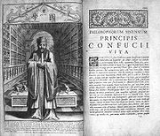
in religious philosophy
is the belief that reason
and observation of the natural world
, without the need for organized religion, can determine that the universe
is the product of an all-powerful creator. According to deists, the creator does not intervene in human affairs or suspend the natural laws of the universe. Deists typically reject supernatural events such as prophecy
and miracles, tending instead to assert that a god (or "the Supreme Architect
") does not alter the universe by intervening in it.
Let reason count the stars, weigh the mounta1ns, fathom the depths — the employment becomes her, and the success is glorious. But when the question is, "How shall man be just with God?" reason must be silent, revelation must speak; and he who will not hear it assimilates himself to the first deist, Cain; he may not kill a brother, he certainly destroys himself.![]()
[T]he Rev. R. Taylor, A.M., the Deist, now in gaol, infamously persecuted by the Whigs for his religious opinions, in his learned defense of Deism called the Diegesis, has clearly proved all the heirarchical institutions of the Christians to be a close copy of those of the Essenians of Egypt. ![]()

